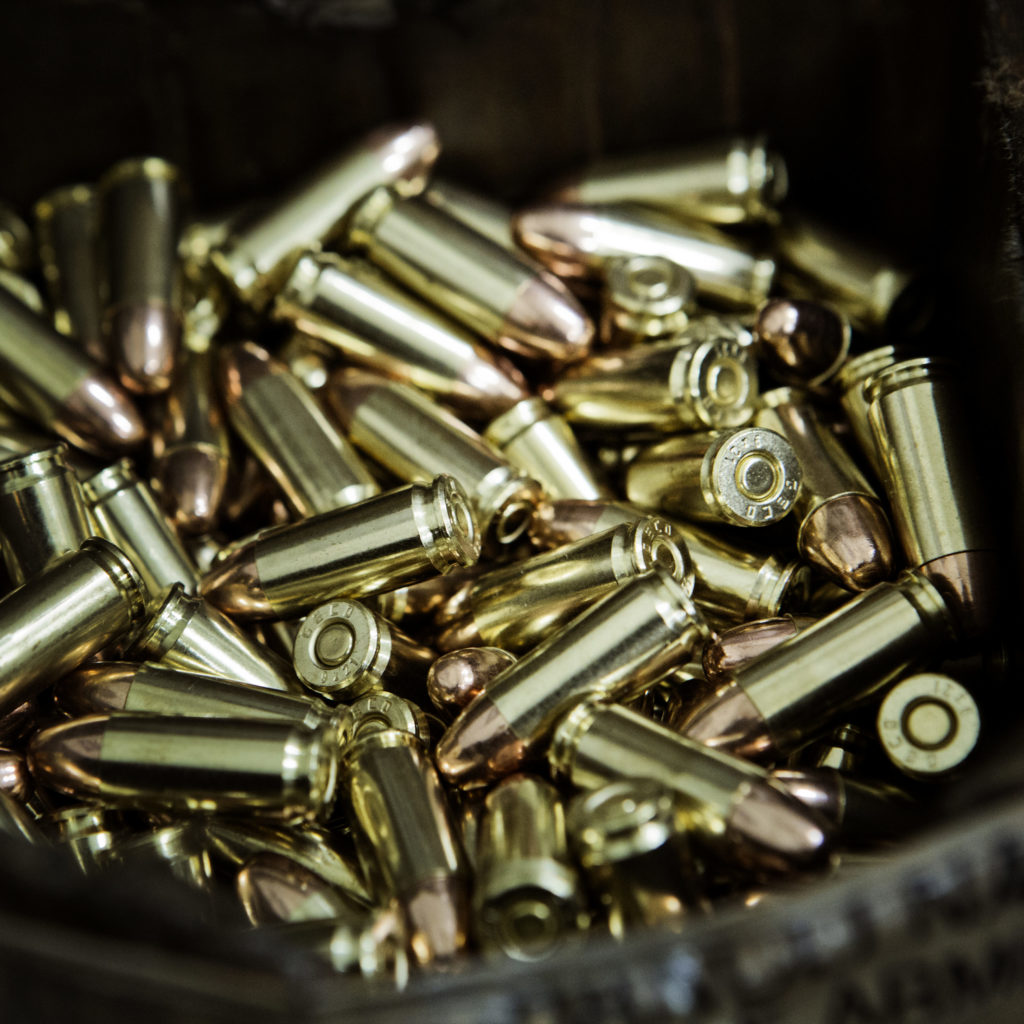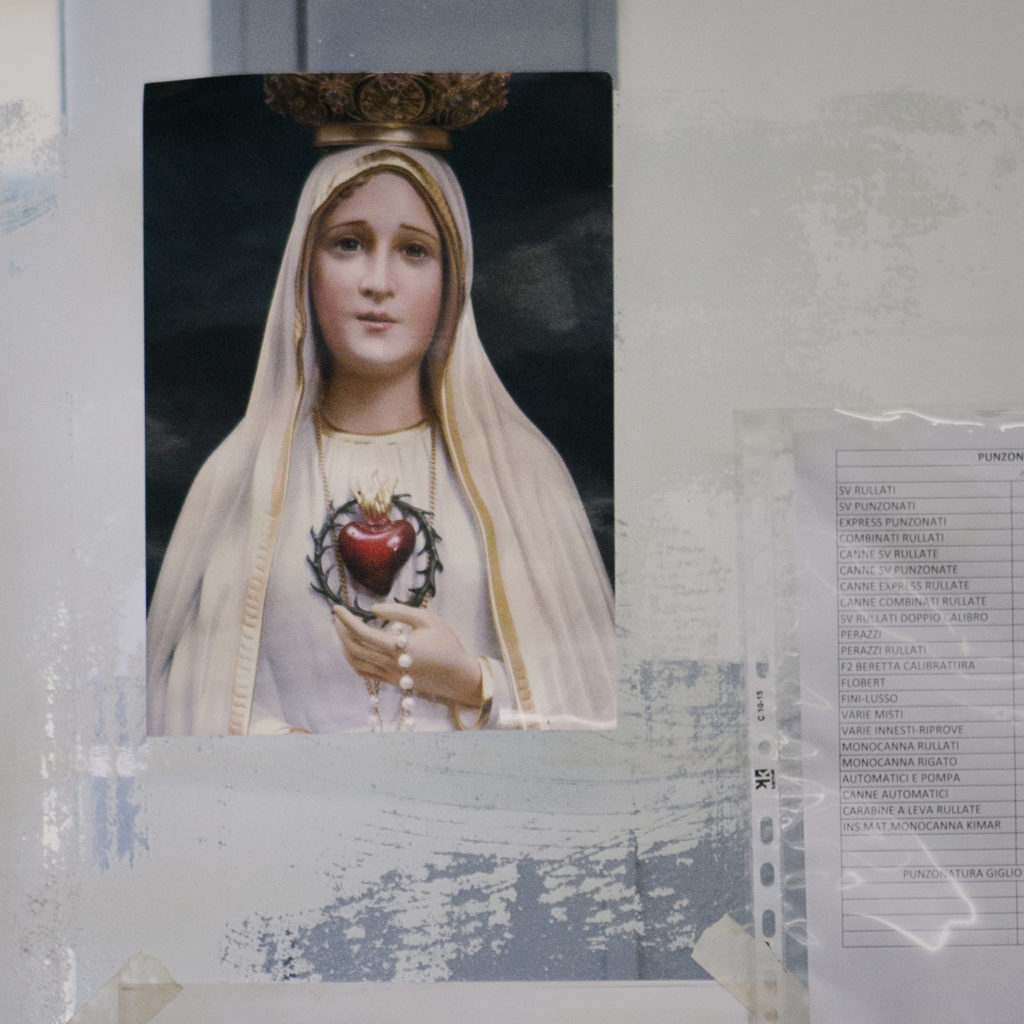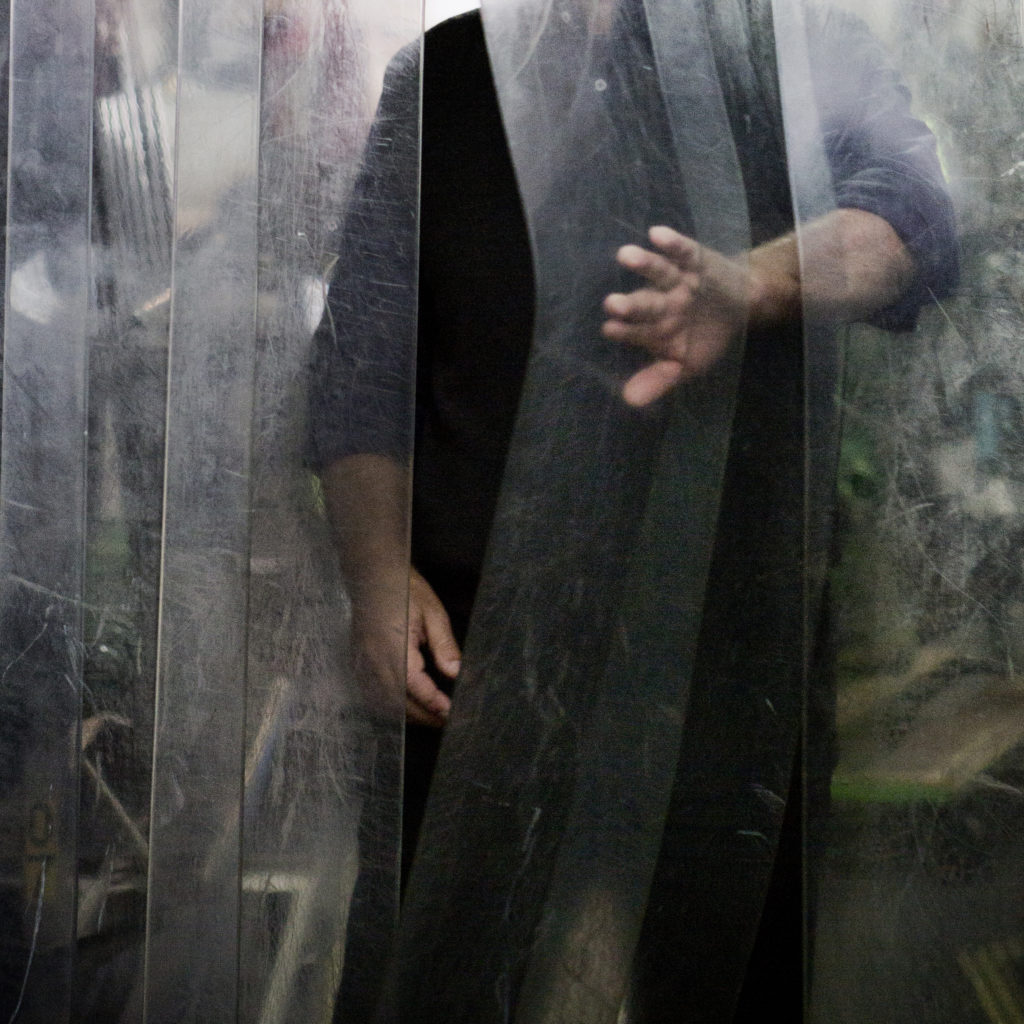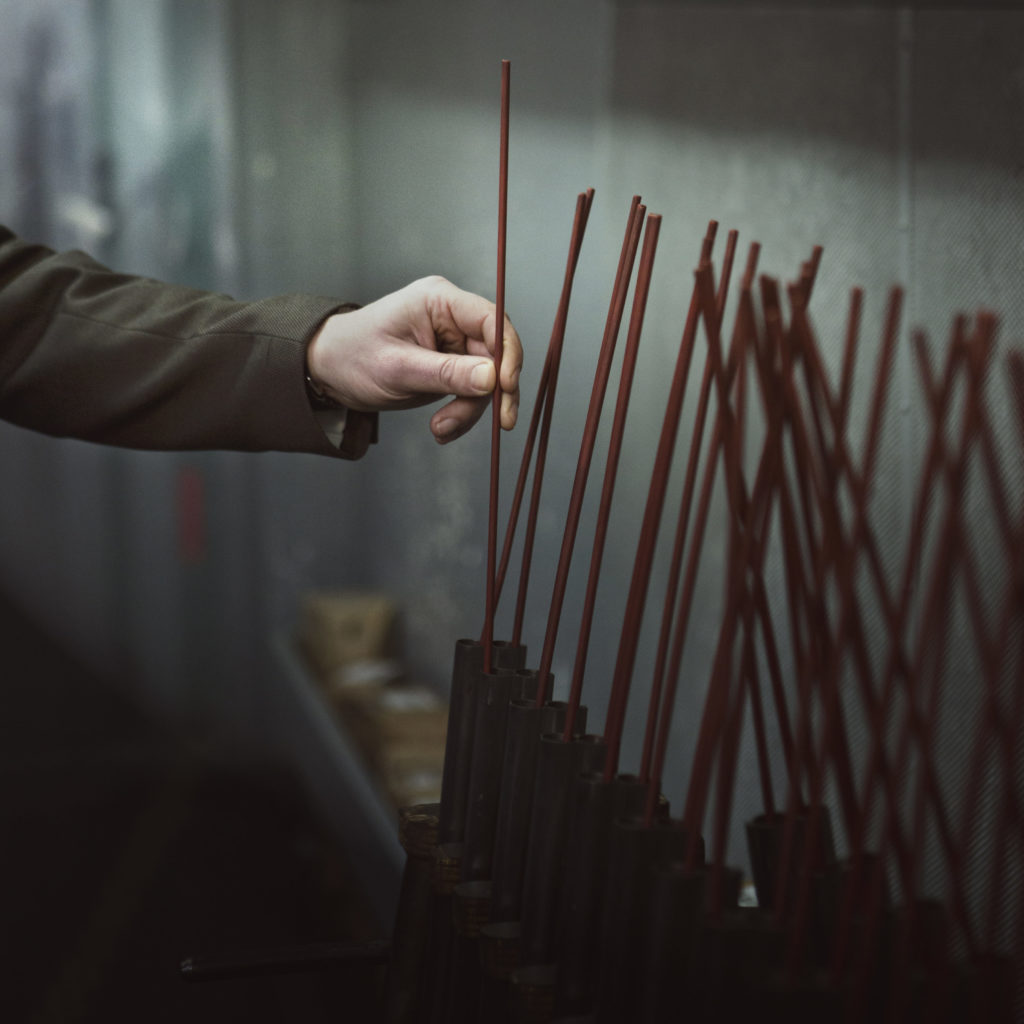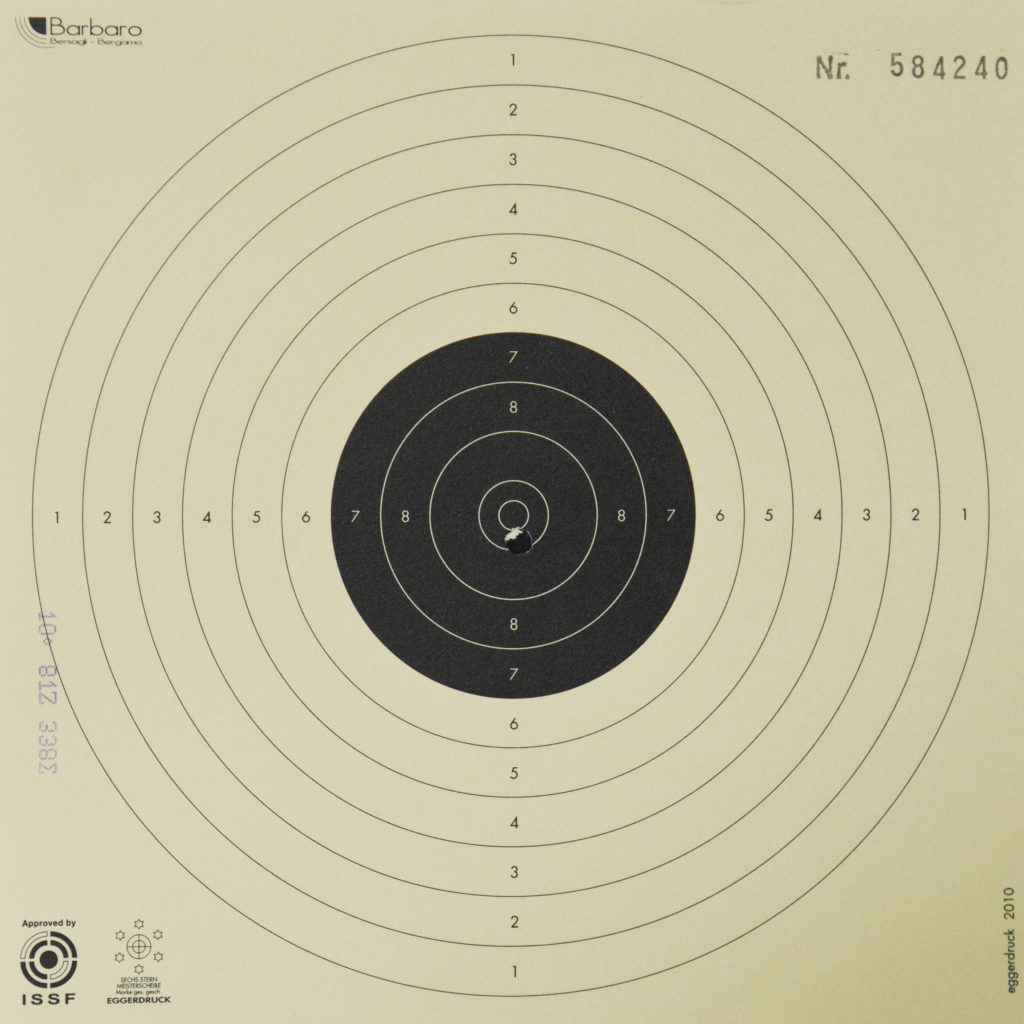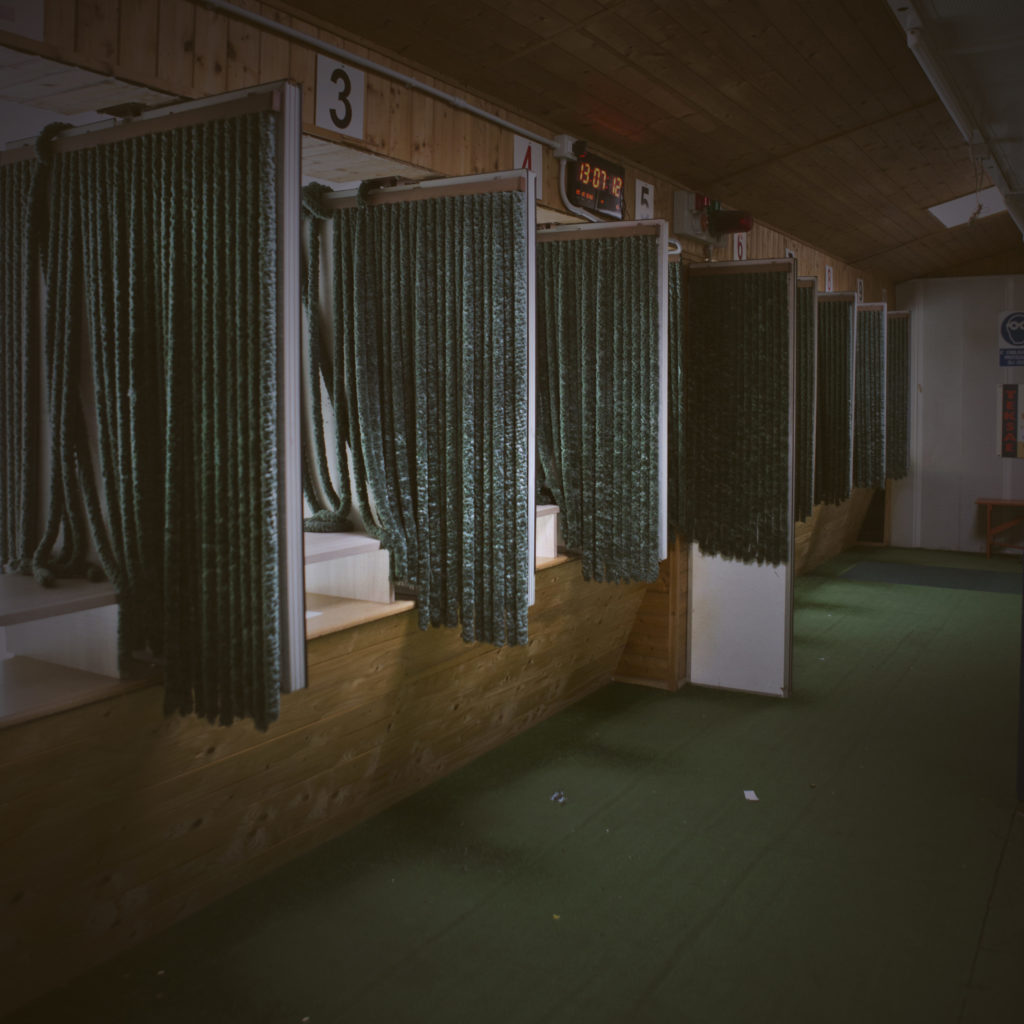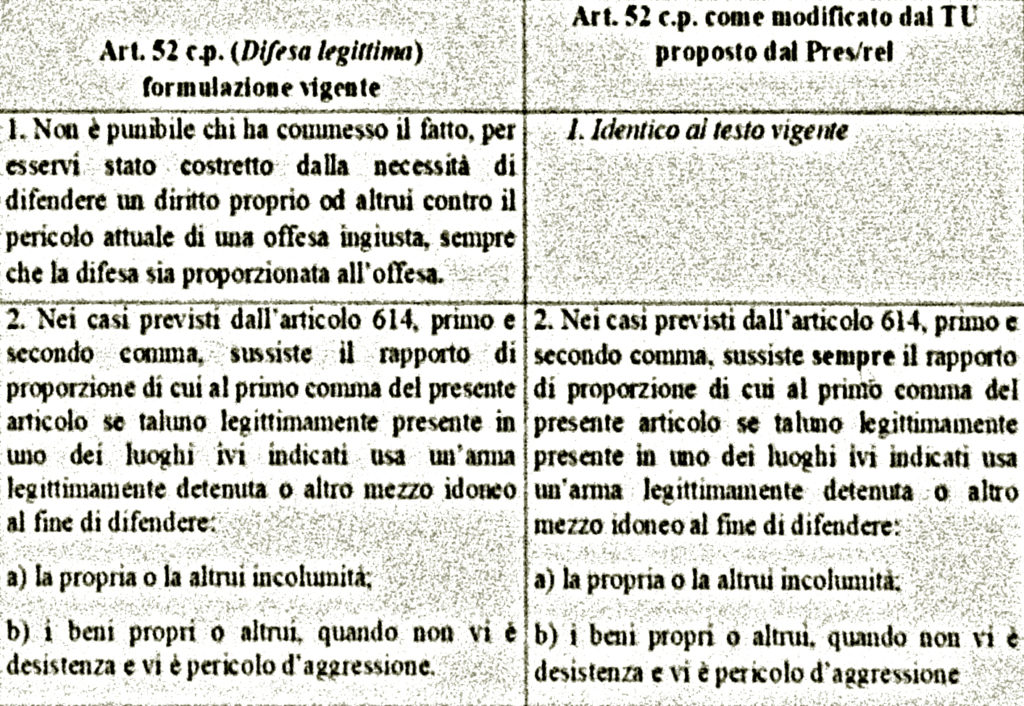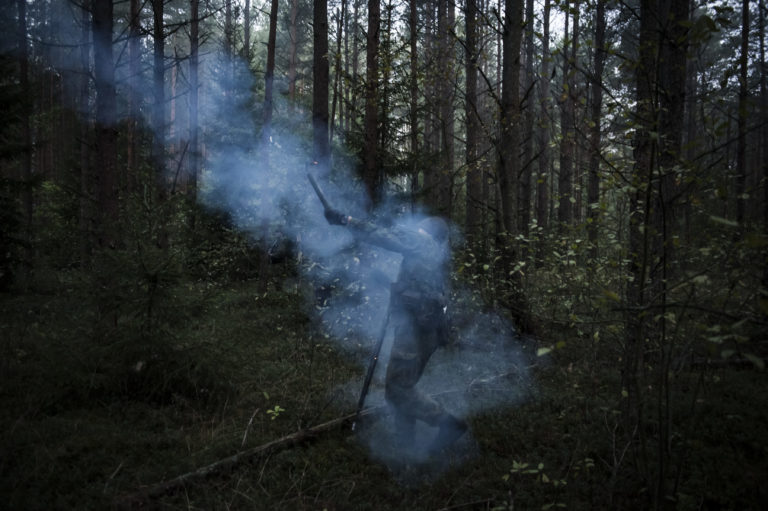
Emanuele Paniz, 43 years old, the new Director of Banco Nazionale di Prova delle Armi (National Proof House), a public body that certifies that firearms comply with safety legislation. Paniz is a former Lieutenant Colonel of RIS, the Scientific Investigation Department who carry out technical-scientific activities as part of preliminary investigations.

An old picture of Mister Emilio Bertella, President of TSN Gardone (shooting range in Gardone Val Trompia). According to him, among the associates of the club, number of people who are interested in self-defence is really low. Most of them are shooting athletes or simply sport passionates. He declares to be a weapons enthusiast, but he doesn't keep any arm in his place because he doesn't feel he could ever need it. He is in favour of the new art. 52 of the Penal Code.
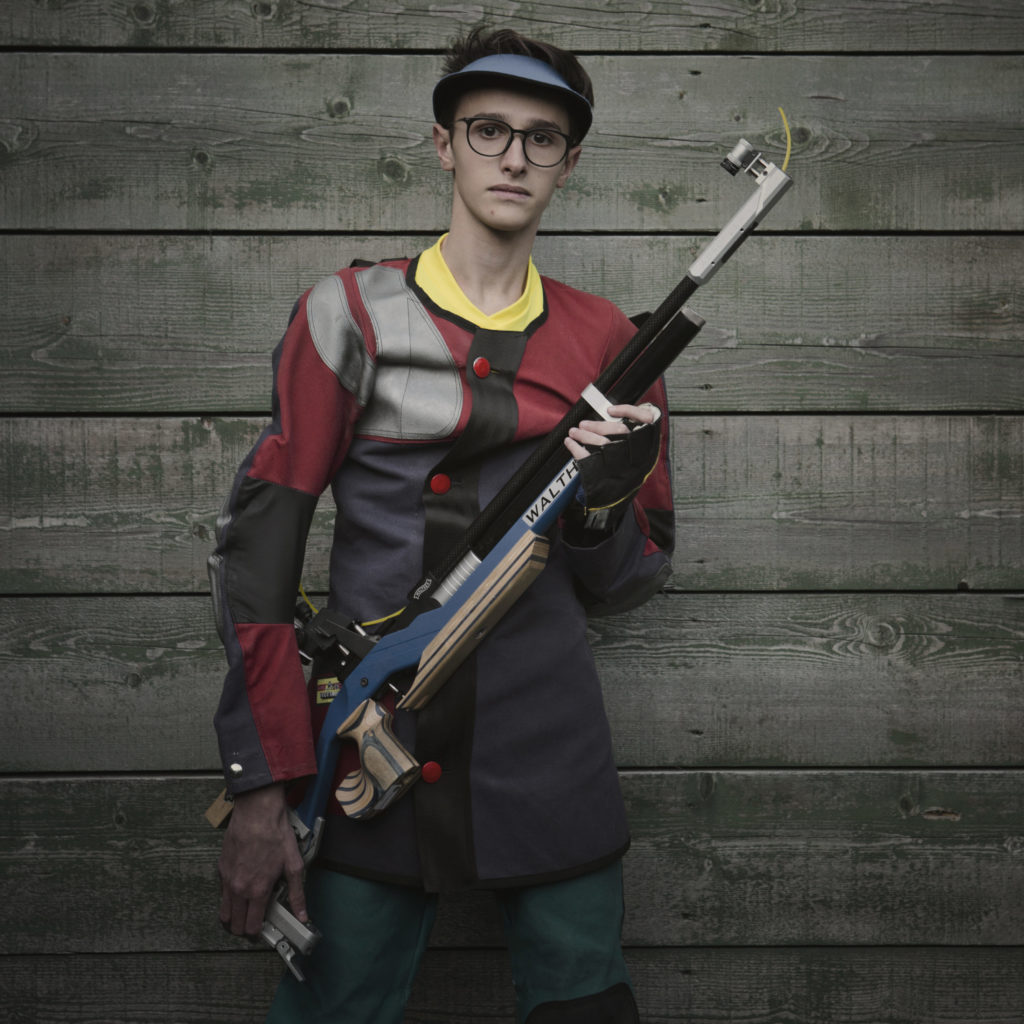
A young athlete with his weapon at TSN Gardone (shooting range in Gardone Val Trompia). According to Italian Law, minimum age for practicing Shooting is 10 years, only with compressed air guns. The use of firearms is allowed from the age of 18 (or 14 years, with parental permission). Shooting is included in the Youth Games program.
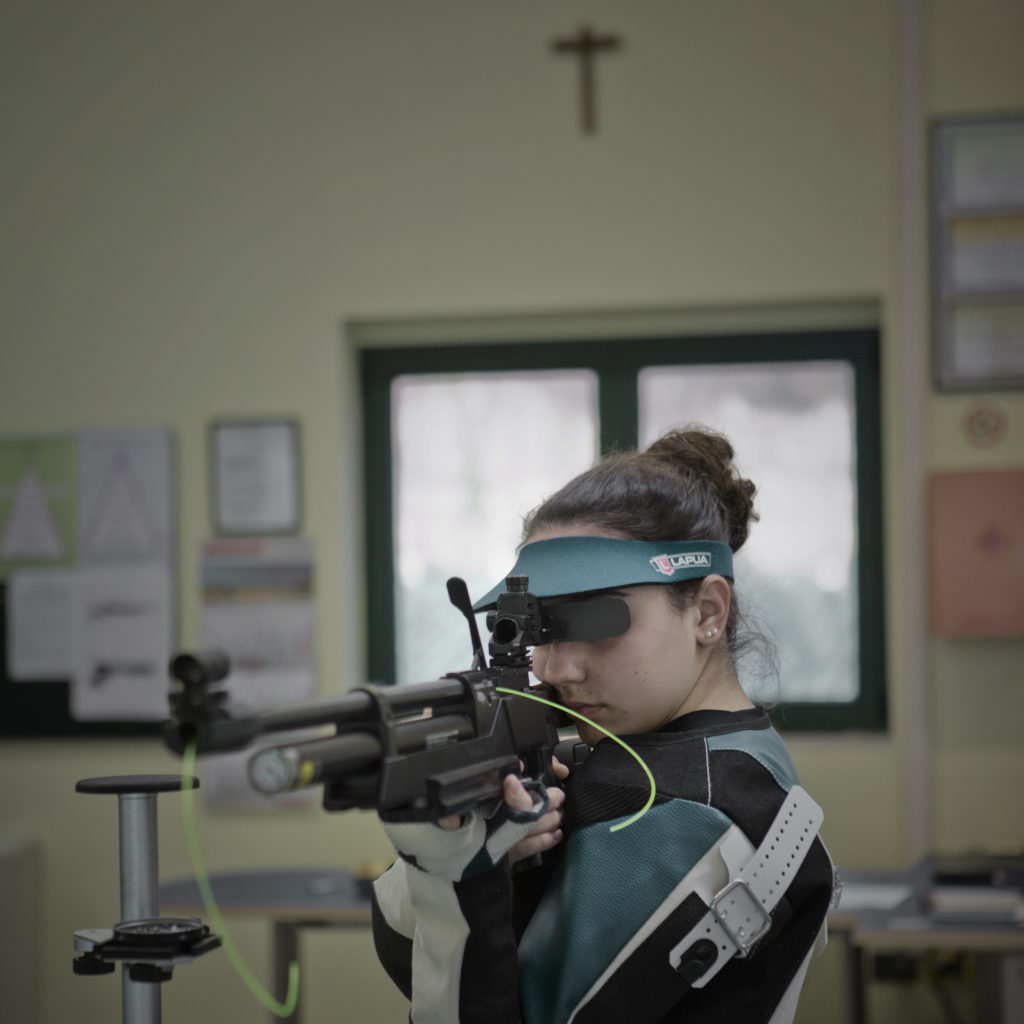
A young athlete with his weapon at TSN Gardone (shooting range in Gardone Val Trompia). According to Italian Law, minimum age for practicing Shooting is 10 years, only with compressed air guns. The use of firearms is allowed from the age of 18 (or 14 years, with parental permission). Shooting is included in the Youth Games program.
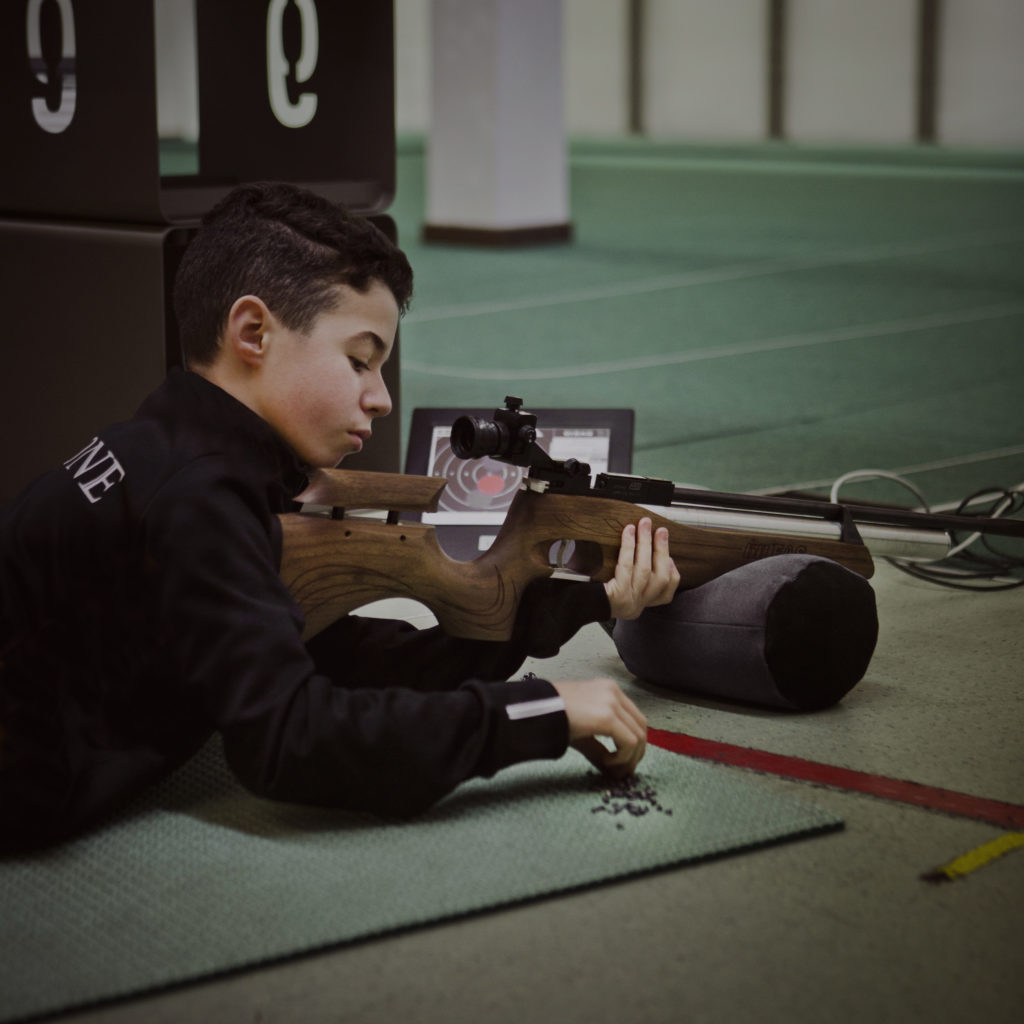
A young athlete with his weapon at TSN Gardone (shooting range in Gardone Val Trompia). According to Italian Law, minimum age for practicing Shooting is 10 years, only with compressed air guns. The use of firearms is allowed from the age of 18 (or 14 years, with parental permission). Shooting is included in the Youth Games program.

Young athletes with their weapons at TSN Gardone (shooting range in Gardone Val Trompia). According to Italian Law, minimum age for practicing Shooting is 10 years, only with compressed air guns. The use of firearms is allowed from the age of 18 (or 14 years, with parental permission). Shooting is included in the Youth Games program.
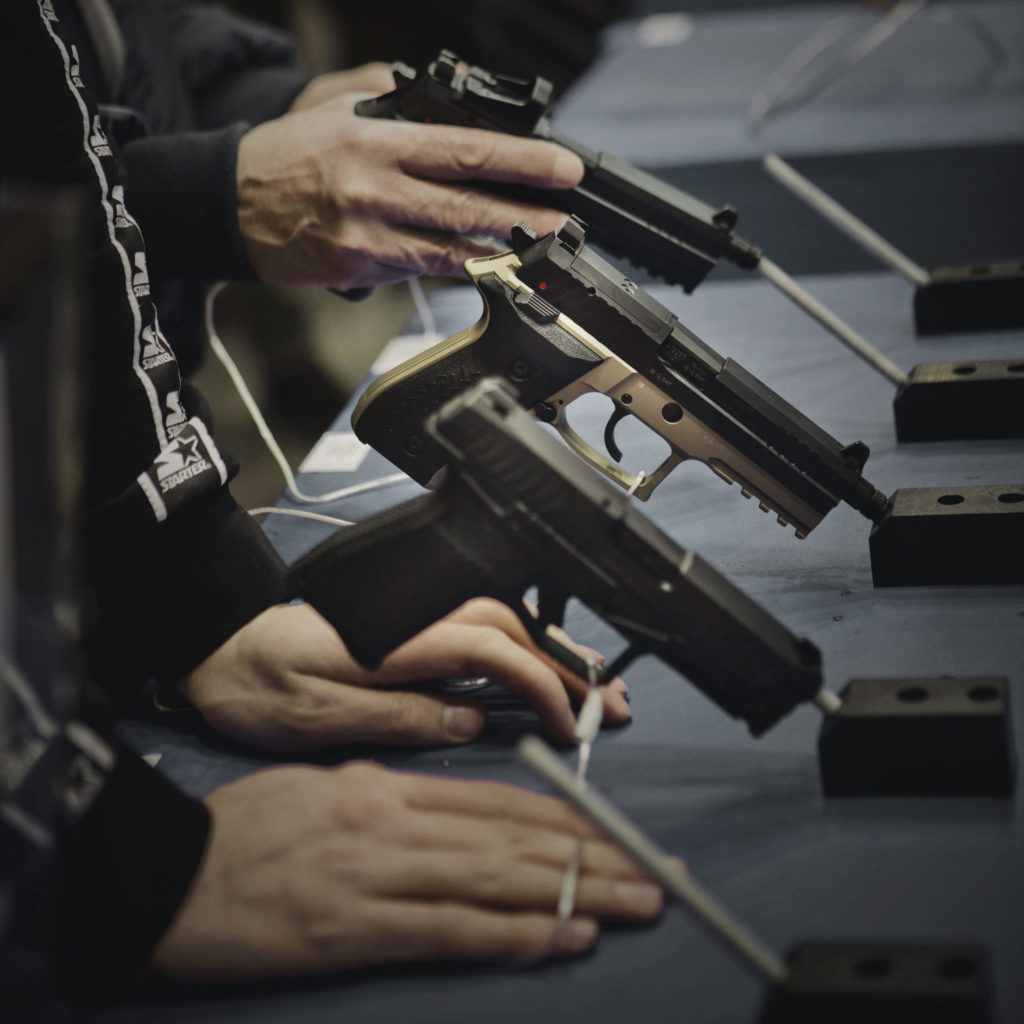
Hit Show - Hunting, Individual protection & target sports expo. The fair is organized every year in Vicenza, Italy. The last edition (february 2019) attracted 40,000 visitors. On the afternoon of the first day, the Minister of the Interior Matteo Salvini paid a visit. Minors and general public are welcome, unlike in other similar shows in the rest of Europe.
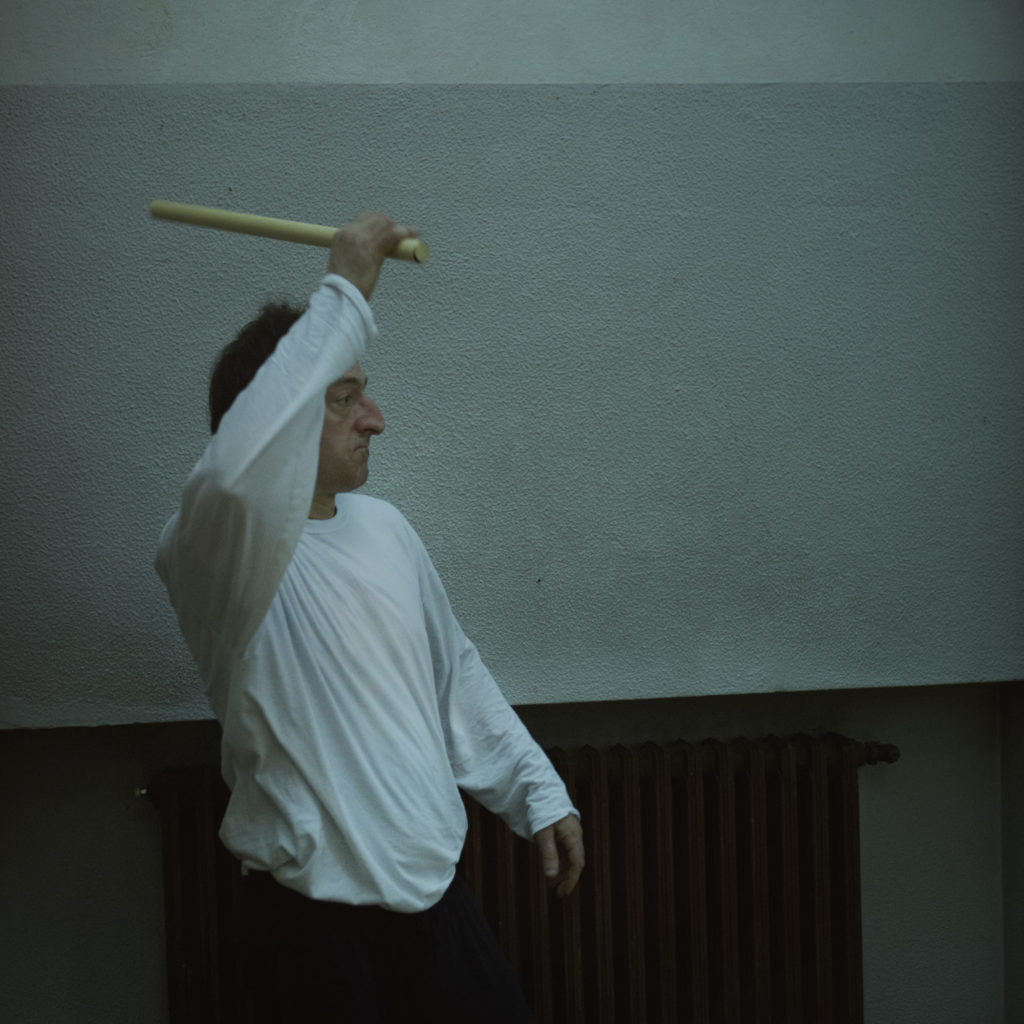
A participant of a Krav Maga lesson in Verona, Italy. Mario Zocca, the trainer, explains that krav maga is an open system which is developed to adapt to real needs of people. Since it responds to military and self-defense criteria, it aims at the immediate neutralization of the adversary, also including those vital points of the body such as genitals, carotid, eyes, etc., that are considered untouchable in combat sports. He has been teaching this "Reality-based System" for 9 years now. In 2010, among his students, only 2 were women. Nowadays they are hundreds. His class is the biggest in Veneto Region, with all kind of participants: teenagers who experienced bullying, housewives, lawyers, victims of rape... According to him, he receives requests from people who would like to learn this discipline on a daily basis, and the interest towards Krav Maga is growing quickly. Mario Zocca also collaborates with schools and insistutions.

Alberto Gamba, owner of a weapons' shop in a small village close to Verona, Italy, with his dog Kimber. Kimber is the name of an American brand of rifles and handguns. According to Stefano Gamba, Italian judicial system is not efficient and the growing need to self-defence in Italy is a consequence of it.

Antonella Chiavalin, President of Venecian ACdV. The association is composed of a territorial network of volunteers who wish to develop participatory security programs in their territory and organize control groups of their neighborhoods. Volunteers make available their free time for the development of the Neighborhood Control Program. The mission of the Association is to spread the culture of prevention, social solidarity and citizen participation in "participatory security" projects, in order to guarantee security within their communities.
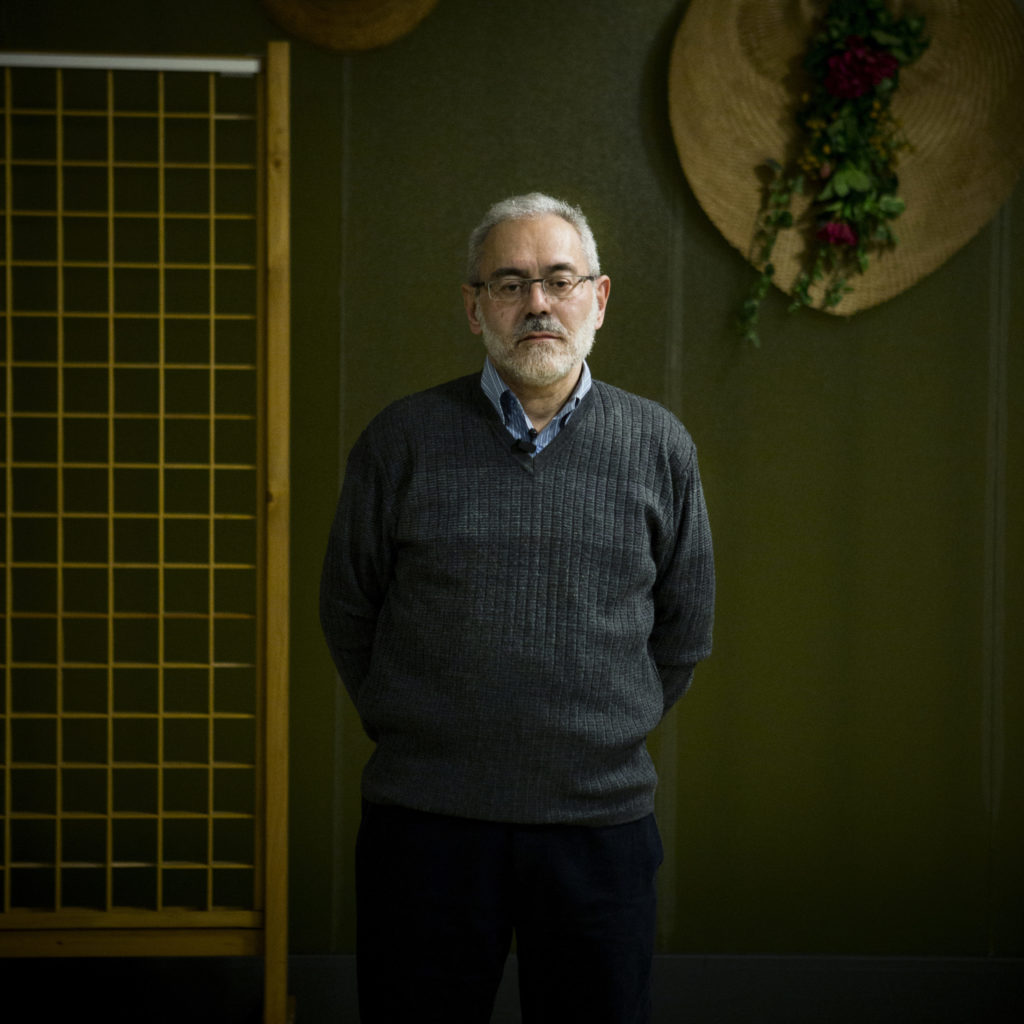
Giorgio Beretta, analyst of OPAL (Observatory on light weapons and security and defense policies). According to him, the new law (art. 52 Penal Code) would bring many Italians to arm themselves. In his public speeches he often mentions the "First Report on the Italian Security Supply Chain" by CENSIS, according to which the change of the law could rise up the gunshot victims in Italy to 2,700 each year, compared to the current 150

A hostess at Hit Show - Hunting, Individual protection & target sports expo. The fair is organized every year in Vicenza, Italy. The last edition (february 2019) attracted 40,000 visitors. On the afternoon of the first day, the Minister of the Interior Matteo Salvini paid a visit. Minors and general public are welcome, unlike in other similar shows in the rest of Europe.
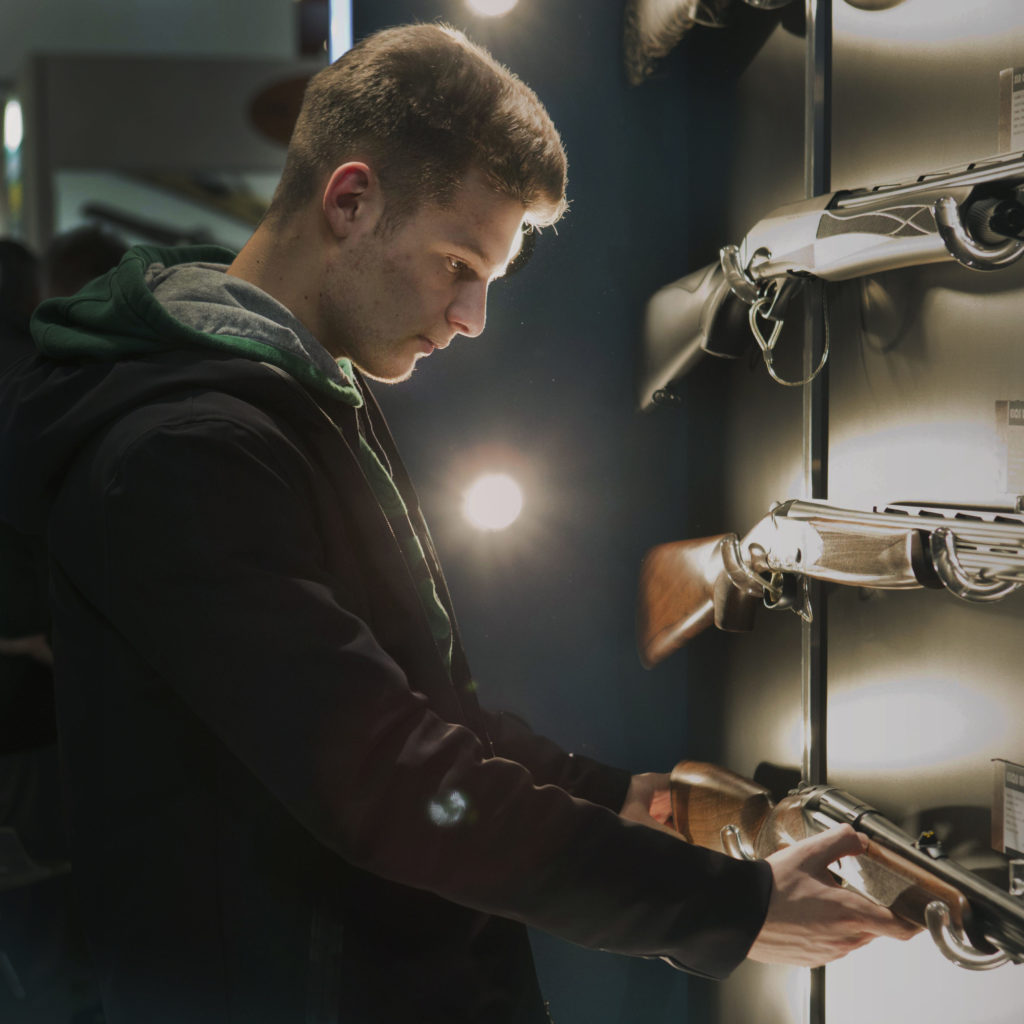
A boy touches a weapon at Hit Show - Hunting, Individual protection & target sports expo. The fair is organized every year in Vicenza, Italy. The last edition (february 2019) attracted 40,000 visitors. On the afternoon of the first day, the Minister of the Interior Matteo Salvini paid a visit. Minors and general public are welcome, unlike in other similar shows in the rest of Europe.

Gabriella Neri's hands during an interview. (Vicenza, Italy) Gabriella Neri's husband, Luca Ceragioli, was killed in 2010 by his former worker, who was mentally disturbed but had a valid guns license. Since then, Neri established "Ogni Volta", an association which purpose is to reflect on the use of weapons and to change the law about guns licenses in Italy.

A night, snowy landscape in the outskirts of Verona, Italy. According to Istat, Italian National Institute of Statistics, women insecurity is higher than that of men: 36.6% of women do not go out in the evening and 35.3% of them, when they go out alone in the evening, don't feel safe. Nevertheless, according to the same Institute, the most serious forms of violence against women are exercised by partners, relatives or friends.
Italy, 2018/2019
“Frames are mental structures that shape the way we see the world.
As a result, they shape the goals we seek, the plans we make, the way we act, and what counts as a good or bad outcome of our actions.
In politics our frames shape our social policies and the institutions we form to carry out policies.
To change our frames is to change all of this. Reframing is social change.”
From the preface of the book “Don’t think of an elephant” by George Lakoff, 2004
The number of crimes are decreasing in Italy. From 1st of August 2017 to 31st of July 2018 there was a decline of 9.5% compared to previous twelve months. Nevertheless, one Italian out of four is afraid to be alone on the street in the evening and one in ten is terrified of staying home alone (according to ISTAT, the Italian Institute of Statistics).
This photographic research aims to investigate why Italy is so scared and how people react to this fear.
The opportunity to approach the topic is the forthcoming discussion in the Italian Lower Chamber about the proposal to change article 52 of the Italian Penal Code. The new law would introduce the “presumption of legitimate defense” which is partially inspired by the USA “Castle Doctrine * “. Its mission is to create an irrebuttable presumption that an individual who kills or harms another within his or hers private property has acted in self-defence and cannot be prosecuted.
According to Giorgio Beretta, analyst of OPAL (Observatory on light weapons and security and defense policies), this new law will bring many Italians to arm themselves.
Apparently, the data confirm his concern: in the last 3 years, about 200 thousand people have started to attend shooting ranges and intensive self-defence training courses while firearms licenses have increased by 14 percent. This growing trend was also confirmed by the last edition of Hit Show, the international hunting weapons fair that took place in Vicenza in February 2019, which attracted over 40,000 visitors.
Interesting data, emerging from the research carried out by the Carlo Bo Faculty of Economics at the University of Urbino, was presented at the show: the production of weapons and ammunition for sport, civil and hunting uses in Italy is worth 7 billion 293 million euro, corresponding to 0.44% of the national GDP, with 87.549 employed, meaning the 0.56% of total Italian workers. Arms and munition production sector grew 19% compared to 2010, driven by exports which accounted for 90.3%.
In the area of Gardone Val Trompia, a small town close to Brescia with 10,000 inhabitants, arms factories produce about 90% of light firearms in Italy, 70% of those in Europe and 50% of those in the world.
If, on one hand, economic interests of arms factories can influence political programs and public debate, on the other it seems that the Italian justice system has a crucial role if we want to understand the reasons why perception of insecurity is nowadays so widespread.
According to 2018 EU Justice Scoreboard, the report published by European Justice Commission, Italy is on the bottom in the European Union regarding efficiency and independence of the courts which highlights alarming problems in the Italian judicial system. Just to mention one of them: in 2016 (the most up-to-date data available) more than 1400 days were necessary to reach the third degree of judgment for civil and commercial disputes.
The 2018 CENSIS** report about Italians’ perception of judicial system is striking: a third of the adult population in the last two years has renounced to undertake a judicial action because they think Italian justice is expensive, slow and unable to guarantee the protection of rights.
In addition to this, 7 out of 10 Italians think that the judicial system does not fully guarantee the protection of the fundamental rights of an individual.
The result of this investigation seems to reveal that Italians tend to react to this frustration by focusing on the idea of private justice and self-defence and the political answer in changing the article 52 indulges to this trend. It almost look like that the government decided to accept the state of affairs as it is and offer a bypass solution which corresponds the popular opinion, as achieving an efficient judicial system is not possible.
It would be interesting to understand if this need of justice could be addressed (and re-framed) differently. If the political reaction was focused on the solution of justice inefficiency, would Italian feel the need to arm themselves?
To conclude: a country in which people can rely on judicial system is a country with less thirst for revenge and private justice?
* Castle Doctrine is a legal doctrine that designates a person’s abode or any legally occupied place (for example, a vehicle or home) as a place in which that person has protections and immunities permitting one, in certain circumstances, to use force (up to and including deadly force) to defend oneself against an intruder, free from legal prosecution for the consequences of the force used
** Italian socio-economic research institute


